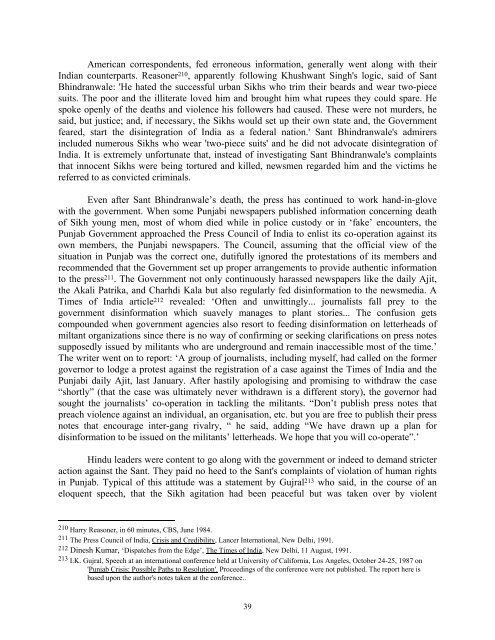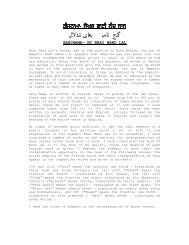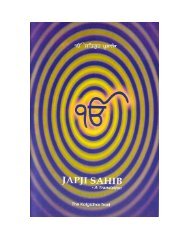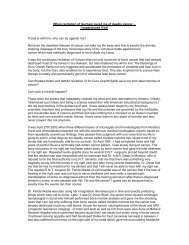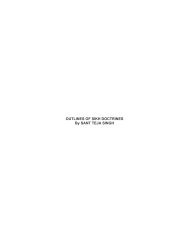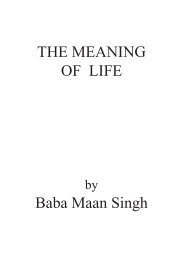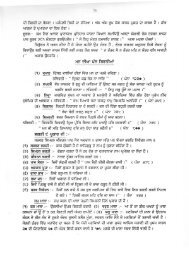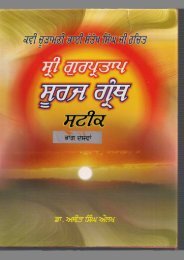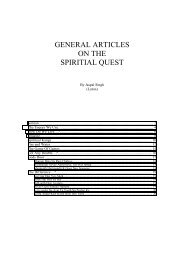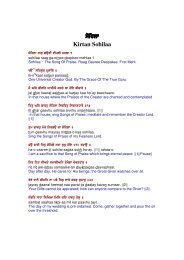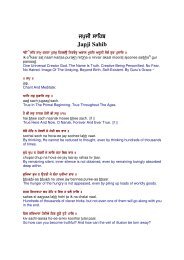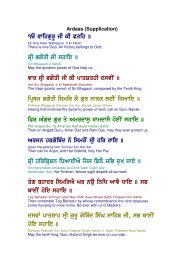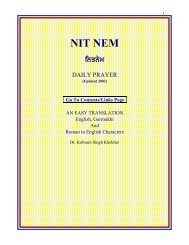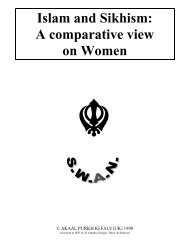Sant Jarnail Singh Bhindranwale - Sikh Missionary Society (UK)
Sant Jarnail Singh Bhindranwale - Sikh Missionary Society (UK)
Sant Jarnail Singh Bhindranwale - Sikh Missionary Society (UK)
Create successful ePaper yourself
Turn your PDF publications into a flip-book with our unique Google optimized e-Paper software.
American correspondents, fed erroneous information, generally went along with theirIndian counterparts. Reasoner 210 , apparently following Khushwant <strong>Singh</strong>'s logic, said of <strong>Sant</strong><strong>Bhindranwale</strong>: 'He hated the successful urban <strong>Sikh</strong>s who trim their beards and wear two-piecesuits. The poor and the illiterate loved him and brought him what rupees they could spare. Hespoke openly of the deaths and violence his followers had caused. These were not murders, hesaid, but justice; and, if necessary, the <strong>Sikh</strong>s would set up their own state and, the Governmentfeared, start the disintegration of India as a federal nation.' <strong>Sant</strong> <strong>Bhindranwale</strong>'s admirersincluded numerous <strong>Sikh</strong>s who wear 'two-piece suits' and he did not advocate disintegration ofIndia. It is extremely unfortunate that, instead of investigating <strong>Sant</strong> <strong>Bhindranwale</strong>'s complaintsthat innocent <strong>Sikh</strong>s were being tortured and killed, newsmen regarded him and the victims hereferred to as convicted criminals.Even after <strong>Sant</strong> <strong>Bhindranwale</strong>’s death, the press has continued to work hand-in-glovewith the government. When some Punjabi newspapers published information concerning deathof <strong>Sikh</strong> young men, most of whom died while in police custody or in ‘fake’ encounters, thePunjab Government approached the Press Council of India to enlist its co-operation against itsown members, the Punjabi newspapers. The Council, assuming that the official view of thesituation in Punjab was the correct one, dutifully ignored the protestations of its members andrecommended that the Government set up proper arrangements to provide authentic informationto the press 211 . The Government not only continuously harassed newspapers like the daily Ajit,the Akali Patrika, and Charhdi Kala but also regularly fed disinformation to the newsmedia. ATimes of India article 212 revealed: ‘Often and unwittingly... journalists fall prey to thegovernment disinformation which suavely manages to plant stories... The confusion getscompounded when government agencies also resort to feeding disinformation on letterheads ofmiltant organizations since there is no way of confirming or seeking clarifications on press notessupposedly issued by militants who are underground and remain inaccessible most of the time.’The writer went on to report: ‘A group of journalists, including myself, had called on the formergovernor to lodge a protest against the registration of a case against the Times of India and thePunjabi daily Ajit, last January. After hastily apologising and promising to withdraw the case“shortly” (that the case was ultimately never withdrawn is a different story), the governor hadsought the journalists’ co-operation in tackling the militants. “Don’t publish press notes thatpreach violence against an individual, an organisation, etc. but you are free to publish their pressnotes that encourage inter-gang rivalry, “ he said, adding “We have drawn up a plan fordisinformation to be issued on the militants’ letterheads. We hope that you will co-operate”.’Hindu leaders were content to go along with the government or indeed to demand stricteraction against the <strong>Sant</strong>. They paid no heed to the <strong>Sant</strong>'s complaints of violation of human rightsin Punjab. Typical of this attitude was a statement by Gujral 213 who said, in the course of aneloquent speech, that the <strong>Sikh</strong> agitation had been peaceful but was taken over by violent210 Harry Reasoner, in 60 minutes, CBS, June 1984.211 The Press Council of India, Crisis and Credibility, Lancer International, New Delhi, 1991.212 Dinesh Kumar, ‘Dispatches from the Edge’, The Times of India, New Delhi, 11 August, 1991.213 I.K. Gujral, Speech at an international conference held at University of California, Los Angeles, October 24-25, 1987 on'Punjab Crisis: Possible Paths to Resolution'. Proceedings of the conference were not published. The report here isbased upon the author's notes taken at the conference..39


